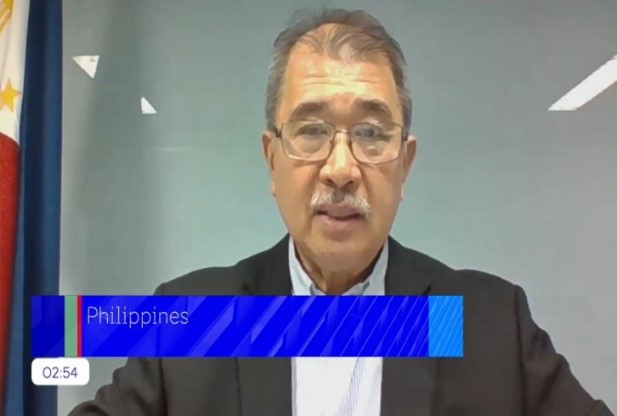

H.E. Fortunato T. Dela Peña, Secretary of Science and Technology, affirms PH support to the Global Declaration entitled “Close the Digital Divides: The Digital Response to COVID-19.”
01 July 2020, United Nations – At the Ministerial Conference on the Digital Response to COVID-19 entitled “Close the Digital Divides: The Digital Response to COVID-19,” DOST Secretary Dela Peña advanced the notion of “multi-stakeholderism” to ensure that no one is left behind in countering the effects of the pandemic.
“Due to the pandemic, the world has witnessed the transition of different sectors adopting and developing digital tools and platforms. However, along these innovations, we are also experiencing emerging and evolving issues such as digital divide, cybercrime, fake news, and threats to human rights. This situation heightens the need for an open, safe, and affordable access to the internet,” Secretary de Peña said.
“We believe that through a strengthened international cooperation, we will survive this global crisis,” he added. In this context, he welcomed the launch of the Global Declaration on the Digital Response to COVID-19 and conveyed PH’s support for the Declaration entitled “Close the Digital Divides: The Digital Response to COVID-19,” including its 10 recommendations to mitigate the effects of the crisis.
Secretary de Peña also shared how the Philippines is harnessing digital technologies to address the challenges brought about by the COVID-19 pandemic. He said that the Philippine government is leveraging the use of smart technologies such as telemedicine, distance learning, urban farming, and digitalization of businesses, and is now looking as to how MSMEs can move faster into the 4th IR stage. He also mentioned the use of software applications in monitoring movement in communities and in enforcing policies for a more inclusive approach while ensuring cybersecurity and privacy; the FASSSTER (Feasibility Analysis of Syndromic Surveillance using Spatio-Temporal Epidemiological Modeler for Early Detection of Diseases) technology to decide on appropriate interventions to COVID-19 through simulation; and Quick Response (QR) codes for Quarantine Control Checkpoints (QCPs) and contact tracing.
He said the Department of Information and Communications Technology (DICT) continues to develop and implement ICT infrastructure and strategic ICT capacity building programs under the “new normal”, such as enhancing the digital workforce, digital education, and digital governance, and strengthening cybersecurity measures.
The Ministerial Conference was convened by Estonia and Singapore, as co-chairs of the Group of Friends on e-Governance and Cybersecurity, to provide an opportunity to discuss how countries can emerge stronger and better equipped from the COVID-19 crisis by using innovative and flexible digital solutions, and working together as a global family.
A Global Declaration on the Digital Response to COVID-19, “Close the Digital Divides: the Digital Response to COVID-19” was also launched at the meeting.
The Conference was participated in by UN Deputy Secretary-General Amina J. Mohammed, International Telecommunications Union (ITU) Director Doreen Bogdan-Martin, Director, Smart Africa Director-General Lacina Koné and 67 Member States including the Philippines.
The Conference may be viewed through https://vm.ee/en/close-digital-divides-digital-response-covid-19 .-END


